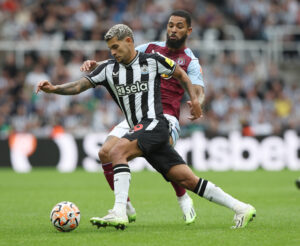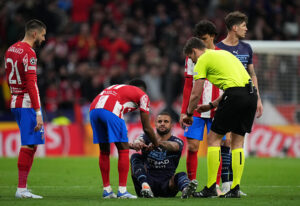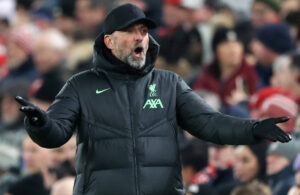South America‘s avid love for football has given the sport a host of great stars over time. With an insanely loyal fanbase and the finest background tales, the continent’s unstoppable carousel of talent is blooming each year and exporting its talent onto Europe and the grandest platforms of football.
One of those talents is Peruvian Claudio Pizarro, who graces from a country with an undeniable love but an incoherent track record on the big stage. Peru have only played in four World Cups, with the last in 1982, and players like Pizarro have never managed to grace the world stage but have made a massive impact elsewhere. In Pizarro’s case, that place is Germany, where he’s made an immense name for himself.
Home
Pizarro’s tale begins in Surco, a district of Lima, the capital of Peru. This is where his education and love for the game was ignited. Raised in a family with an indisputable hunger for sport, Pizarro had an avid interest in track and field, tennis and basketball, but football was always the place where his passion remained.
Raised under the horrifying days of the Shining Path, Peru’s most dangerous and vicious terrorist organisation, which is still in existence today, Pizarro failed to receive support from his surroundings and government whose main objective was to abolish the group and not excel at sport. Despite the circumstances, Pizarro was still adamant on his goals and never gave up on his dream.
In 1986, Claudio Pizarro watched an unstoppable Diego Maradona tear teams apart at the World Cup in Mexico. Maradona’s wizardry with the ball, combined with his deft touch and the unforgettable ‘Goal of the Century’ against England, inspired Pizarro, whose journey was about to kick off.
At the age of 13, Pizarro joined the youth setup at Academia Cantolao, Peru’s finest for breeding young footballers. Four years of training saw him earn his first professional contract in football, but it was 400 kilometres away from home, with Deportivo Pesquero. Two seasons in Deportivo green saw him score 11 times in 41 games. His early form impressed many, and one club made a move.
Alianza Lima, Peru’s second most successful club, and Pizarro’s favorite signed the 18-year-old up in 1997. Over the course of two seasons, Pizarro amazed a sensational 25 goals in a little over 50 appearances for the club.
In 1999, he showcased his talents to the world with a stunning five-goal haul within an hour in a game against Unión Minas. Pizarro was now attracting attention from clubs across Europe. One club from Germany made a move. Werder Bremen was the next stop on Claudio Pizarro’s journey.
Germany
Claudio Pizarro’s move to Werder Bremen made him a hero in Peru. Handed the number 10 shirt, the same as Diego Maradona, he was living the dream. A two-year stint in the northwest of Germany saw him score 38 times, averaging a goal every alternate game. His legacy early on at Werder Bremen opened up more possibilities for Peruvians in Europe and was already seen as a legendary figure in the nation.
Much of the summer of 2001 saw him make the front pages of newspapers in Peru and Germany. Werder Bremen said they would not stop Pizarro from joining another side and that brought out interest from clubs like Inter Milan, Barcelona, and Real Madrid. However, it was Werder’s domestic rivals Bayern Munich who made their move and attained Pizarro’s services.
He was handed the number 14 shirt upon his arrival and made an instant impact on his debut, scoring inside the first four minutes against Schalke 04. Pizarro was influential in Bayern’s plans that season, scoring an impressive 15 goals in 30 league games as Bayern finished third in the Bundesliga.
He won his first major club honour that season as Bayern beat Argentine side Boca Juniors in the Intercontinental Cup. His impressive form earned him the nickname of the ‘Anden Bomber’, in reference to his home country of Peru and Bayern legend Gerd Müller.
The following season brought greater success and Pizarro’s biggest honour to date. Despite going out of the Champions League in embarrassing fashion, Bayern won the Bundesliga and the DFB Pokal with Pizarro scoring 19 times in 44 games, the second largest tally in the Bayern side. He was now a coveted figure among Peruvians and a hero in his homeland.
Rift
Goals and trophies followed for Claudio Pizarro and Bayern Munich. Following their 2002-03 double success, they repeated their feats in the 2004-05 and 2005-06 campaigns. Pizarro notched a decent 50 goals in over 110 appearances in that phase, earning plaudits for his fine performances.
However, it all came crashing down on him in 2007. With his contract coming to an end at the culmination of the season, negotiations weren’t making any progress, with Pizarro wanting a raise on his current contract. This angered Bayern chairman Karl-Heinz Rummenige, who launched a vile tirade:
“Anyone wishing to earn as much as Shevchenko had better start playing like Shevchenko.” – Karl-heinz rummenige, 2007
Towards the end of May that year, amidst interest from sides like Sevilla, Valencia, and Benfica, Pizarro made a shock move to England with José Mourinho‘s Chelsea on a free transfer.
England
His stint at Chelsea began brightly. Donning his now infamous number 14 shirt which he wore at his previous clubs, Pizarro made a quick start to life in London scoring against Birmingham City on the opening weekend of the Premier League campaign. Although, things were about to turn for the worse for him.
José Mourinho’s breakdown with the Chelsea boardroom saw him leave the club midway through the first half of the season. His successor, Avram Grant, saw Pizarro being surplus to requirements at the club, with the Israeli boss preferring Nicholas Anelka. He made sporadic appearances for the rest of the season and was forced out by the end of it.
By the start of the 2008-09 campaign, A club he was largely familiar with made a move for him. With a fine history there, a move seemed a no-brainer. He left England with just 2 goals and a spoilt image.
Return
Werder Bremen took him back on loan for the 2008-09 season, with Pizarro returning a magnificent 28 goals in 46 appearances, a DFB-Pokal success and a ticket to Istanbul for the UEFA Cup final against Shakhtar Donetsk. They lost the final, but Pizarro made a huge name for himself that season.
His deal was made permanent in the following campaign and he was to be their best player for the coming seasons. He got his 134th Bundesliga goal in October of 2010, overtaking Giovane Élber as the league’s greatest ever foreign goalscorer. In his final season at Werder in 2011, Pizarro cemented his legendary status with 18 goals, leaving Bremen with an astonishing record of 88 goals in a four-year stint.
He rejoined Bayern Munich in the 2012-13 campaign under Jupp Heynckes. With his career nearing its end, he was more than happy to play as a backup to Mario Gomez and Mario Mandžukić. But he did more than that. He found the net 13 times, with 4 coming in one game against Hamburg, as well as a Champions League hat-trick against Lille.
He achieved his dream of being a Champions League, as well as a treble winner in that campaign. Despite a bit-part role, his honours that season made him one of the most coveted South American footballers in history.
The arrival of Pep Guardiola the following season limited his appearances. With the Spaniard‘s preference for young and more agile players, Pizarro ended his stint at Bayern with 43 games, most from the bench, over two campaigns before deciding to sport green once again.
Legacy
Claudio Pizarro joined Werder Bremen for a third time with a large audience coming to the airport to welcome their returning hero. In the spring of 2016, Pizarro scored a hat-trick against Bayer Leverkusen to break a 31-year-old record by becoming the oldest player in the league’s history to score a treble of goals.
A cultured forward of an elegant background, Pizarro is still going strong in the Bundesliga. His exploits in Germany have paved the way for a generation of South American footballers, and his class and excellence have earned him a fine cult status. Currently the fifth-highest goal getter in Bundesliga history, he’s still a vital player for Werder Bremen at the age of 37 and is an entertainer of the highest order.
Main Photo






